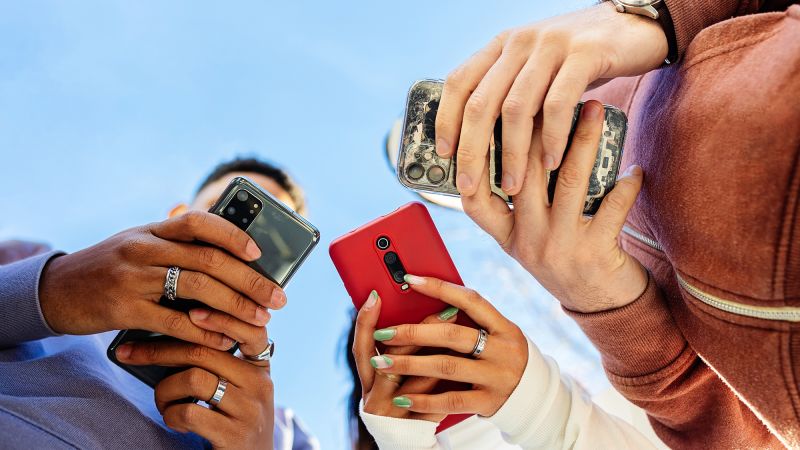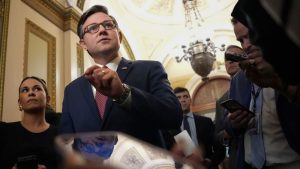Influencers are playing a big role in this year’s election. There’s no way to tell who’s getting paid for their endorsements

—
“There are only 22 days more to vote, so like seriously go vote … it’s so important to me that we mobilize our community to Pokémon Go to the polls,” influencer Mikey Angelo, who’s known online for his comedic rap videos, said in a recent Instagram video.
Angelo was paid by a Democratic political action committee for the post, a fact that’s clearly noted in the caption. But he didn’t legally have to disclose the relationship.
Partnerships with influencers have become an increasingly popular campaign strategy. But a regulatory gap means that unlike political ads that run on TV — or typical sponsored content that influencers post for brands — content creators are not required to disclose if they’ve been paid to endorse a candidate or speak about a political issue on their page.
A campaign can post a video on its own platforms and then pay an influencer to promote it, or pay an individual to create his or her own promotional material for a candidate, without the campaign or influencer having to disclose anything, the Federal Election Commission determined earlier this year.
That means users are often left to try to judge for themselves which posts are paid endorsements versus creators’ genuine, freely shared expressions of support when they’re mixed together in feeds — along with the regular collection of normal posts and non-political #sponcon — sometimes, with no indication of which is which.
And that could further complicate an already muddy information ecosystem, at a time when nearly 40% of young Americans say they regularly get their news from TikTok and when US adults under 30 are nearly as likely to trust information from social media as from national news outlets, according to the Pew Research Center.
Campaigning moves to social media
In 2024, political content posted by social media creators has become just as important as traditional celebrity endorsements — if not more. Influencers often have huge, engaged followings who trust them because they bring a sense of authenticity that traditional celebrities, like actors and entertainers, lack.
And politicians want to take advantage of that. If influencers’ vast followings already take their advice on everything from dietary supplements to parenting, politics could be added to the mix, too.
“Influencers might not seem as professionally curated as trained actors and actresses,” said Krysten Stein, an assistant professor of communication at the University of Cincinnati Blue Ash College.
“We tend to trust people who are more real or more like us,” she said. “And then if they endorse a candidate, well, ‘Hey, they’re kind of like me. We have similar interests or are from a similar place.’ So, sure, I might trust them more.”
In July, between posts about vacations, his nascent boxing career and his body wash brand, influencer Jake Paul posted an Instagram video showing him play-fighting with former President Donald Trump. “We need Trump to knockout all his opponents on Election Day,” Paul said in the caption of the video, which racked up more than 1.5 million likes.
Last month, Democratic vice presidential nominee Tim Walz appeared in a YouTube video going for a walk with his dog, Scout, and Matt Nelson, the human behind the popular channel We Rate Dogs. The video, which served as a sort of get-to-know-you opportunity for Walz, gained more than 600,000 views on YouTube; a clip posted to X was viewed more than 1.5 million times. (A representative for Nelson said he was not paid for the video; Paul also was not compensated for his appearance with Trump, according to a person familiar with his business.)
This year’s Democratic National Convention also provided media credentials to more than 200 influencers, along with a cushy “creator lounge” from which to post content about Vice President Kamala Harris’ White House bid.
Angelo’s post is part of a $2.7 million digital campaign from Democratic political action committee Priorities USA, which has contributed to election efforts for Harris, and voter engagement PAC Somos Votantes. Together, the two organizations paid 15 social media creators to produce content encouraging Latinos to vote. (Angelo did not respond to a request for comment.)
“It’s no surprise that in a political environment, when our No. 1 job is to have our message resonate and break through and be trusted, that working with content creators who already have trust built up with their followers just makes a lot of sense,” said Danielle Butterfield, executive director of Priorities USA, which has also run influencer campaigns around local elections and progressive issues like reproductive rights.
Priorities typically works with influencer marketing agencies to determine how much to pay a creator, Butterfield told CNN. But the organization leaves partnership and payment disclosures up to the creators themselves.
“We’re working with a lot of folks who haven’t done political work before, so there’s often a little bit of confusion around, ‘Oh, I don’t have to disclose? That’s not the law?’ So we often have to explain that [there is no disclosure law,],” Butterfield said. “We walk the creators through what the rules are and then we leave it up to them to determine how they want to post their content.”
Influencers on both sides of the aisle
In the second half of 2020, Trump’s then-reelection campaign paid nearly $1.8 million to an influencer marketing business, Axios reported in early 2021, citing Federal Election Commission filings.
Also on the right, conservative group Turning Point USA has a yearslong history of training and promoting influencers — its website touts partnerships with the likes of right-wing activist Jack Posobiec and Riley Gaines, the former NCAA swimmer who has opposed including transgender athletes in women’s sports — to spread its message.
And Tana Mongeau, a YouTuber with more than 5 million subscribers, suggested during an episode of her podcast last month that she was offered “millions” to endorse an unnamed political party on social media. Mongeau had already publicly backed Harris, implying that the offer came from elsewhere. Mongeau spoke in vague terms about the endorsement offer, but indicated that she’d turned down the money.
“I was being allegedly told and alleged list of other influencers that have already, hypothetically, accepted money to do those hypothetical things,” Mongeau said. (Spokespeople for Mongeau didn’t respond to CNN’s requests for an interview.)
The Harris campaign declined to comment for this piece. The Trump campaign, as well as the Democratic National Committee and Republican National Committee, did not respond to requests for comment.
‘The public is entitled to know’
The Federal Trade Commission in 2019 laid out new guidelines for social media influencers, requiring them to clearly label posts for which they’d been paid to promote a product or company, by adding a disclosure such as #ad or #sponsored in the caption. But by law, the FTC’s rules can cover content related only to “commerce,” said spokesperson Mitchell Katz, citing agency guidance.
Election advertisements are overseen by a different agency, the Federal Elections Commission, which lacks a similar disclosure rule for individuals who are paid to make endorsements on social media. The FEC does have strict transparency rules around paid political communications over the phone, on TV or on physical mailers — everyone is familiar with those “paid for by” disclosures — but those requirements don’t apply to influencers.
The FEC had the opportunity last year to extend its rules to influencers, but chose not to, saying that campaign payments to individuals fell outside the scope of a broader package of regulations for ads involving payments to a “website, digital device, application, or advertising platform.”
The commission determined that campaign payments to creators to produce political messaging are not “public communications” that would require disclosure.
Despite voting for the overall package, two FEC commissioners dissented over the decision on influencers, saying the agency “missed a golden opportunity” to issue clear guidance on a growing means of political communication.
“The public is entitled to know when those influencers are being paid to spread a political message,” wrote Commissioners Ellen Weintraub and Shana Broussard, who were appointed by former Presidents George W. Bush and Trump, respectively.
In the absence of federal regulations, some platforms have instituted their own rules, although enforcing them may be tricky if creators aren’t up-front about their relationships with political groups.
Meta, the parent company of Facebook and Instagram, has since 2020 allowed paid political content from influencers, so long as the organization paying for it is registered in its ad library. TikTok says it does not allow any political advertising, even from creators. TikTok removed one video that was labeled as part of the Priorities USA and Somos Votantes campaign after CNN flagged it to the platform.
Unintended consequences
Critics say that if individuals were required to disclose paid political posts, it could have unintended consequences for political speech — especially when any payments to influencers should already be reflected in the campaigns’ own routine expenditure reports.
The FEC should take steps to make it easier for the public to access this information before cracking down on creators, said Ari Cohn, a First Amendment law expert at the think tank and advocacy group TechFreedom.
“I don’t want to live in a world where to be able to post things about politics online, I have to consult a lawyer first,” Cohn said, adding that although the FEC says the current rules don’t apply to influencers, a future FEC could easily come to the opposite interpretation.
While politicians can and should try to reach voters where they are, the advent of new technologies doesn’t change campaigns’ underlying obligation to behave ethically on those platforms, said Robert Weissman, co-president of Public Citizen, an accountability non-profit.
“It makes all the sense in the world for campaigns to pitch themselves to influencers and ask them to carry forward their message,” Weissman said. “If it’s a financial transaction, though, it’s vital that the money flow be disclosed, that people know the influencers are taking action because they’ve been paid, not just out of belief.”
To be sure, not every creator is quietly earning money for weighing in on the election. There are likely plenty of cases where creators aren’t being paid for posting but are just “already really engaged” in the political conversation, said Cate Domino, a senior vice president for digital at Precision Strategies, a Democratic consulting firm.
Campaigns may know “which messages are super important, but they’re having trouble getting to resonate with the right audiences,” so they partner with politically engaged creators to “help us get this message out,” said Domino, who added that her firm does not work directly with the Harris campaign.
“There is something in it for the creator too, right?” she said. “If the campaign is lifting up their content, that’s them reaching a whole host of people who — especially if you’re a creator who’s known for your advocacy work — probably like really align with the content that you’re putting out.”
Source: https://www.cnn.com


